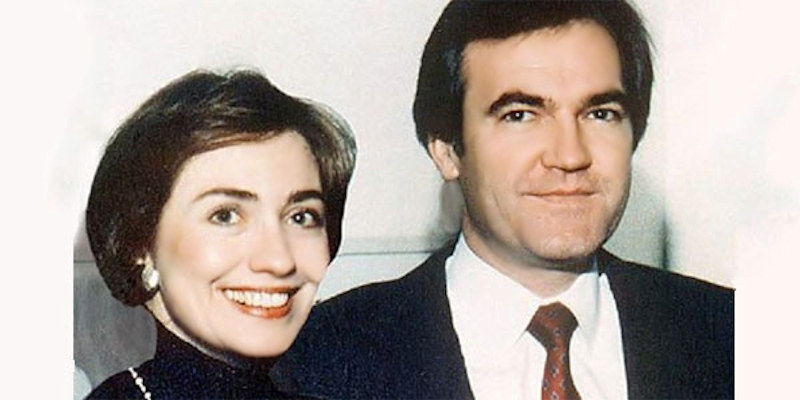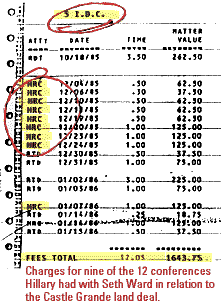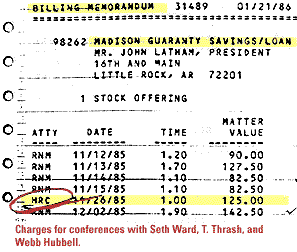Hillary Clinton’s handling of the Rose Law Firm Billing Records was a Harbinger for Modern-Day Document Disappearance and DestructionThe Mainstream Media have ignored Hillary Clinton’s obstructions and behavior for decades. Hillary Clinton has a long and shameful history of document tampering and questionable legal maneuverings. Case in point; the Rose Law Firm Billing Records. In case you forget or are learning about this for the first time; the subpoenaed Rose Law Firm Billing Records showed up in Hillary’s private quarters at the White House a week after the statute of limitations ran out on some suits concerning Hillary’s part in the failure of Madison Guaranty. Both Hilary’s and Vince Foster’s fingerprints were on the files. The special prosecutor concluded that Hillary had obstructed of justice but apparently the American people were not ready to see the first lady indicted. From Frontline: Once Upon A Time In Arkansas:In January 1996, a long sought-after copy of billing records from the Rose Law Finn were identified and turned over to prosecutors by Carolyn Huber, a White House assistant to Hillary Rodham Clinton. Ms. Huber, herself a former Rose Law Firm employee, recognized the records and realized that they had been among papers that she had removed six months earlier from the First Lady’s book room on the third floor of the White House. The mysterious appearance of the billing records, which had been the specific subject of various investigative subpoenas for two years, sparked intense interest about how they surfaced and where they had been. Shortly after the discovery of the records, Hillary Clinton made history — she became the only First Lady ever called to testify before a Grand Jury inquiry. What They Reveal
According to the Rose records, Hillary Clinton billed Madison for 60 hours of work over a 15 month period. Ms. Clinton’s attorney argues that this represents a de minimus amount of work and includes billings for work performed by Rose Finn lawyers working for Hillary Clinton at the time. But Whitewater investigators believe that the billing records show significant representation. They argue that the records prove that Ms. Clinton was not only directly involved in the representation of Madison, but more specifically, in providing legal work on the fraudulent Castle Grande land deal. In particular, investigators zeroed in on the individual billings, including a dozen calls and meetings with Seth Ward, the individual whom regulators determined was a “straw man” in the Castle Grande deal. These contacts occurred during a period of time, including early 1986, that Ward was engaged in efforts to obtain sales commissions from McDougal that would later tip regulators to illegalities at Castle Grande.
The records also identified what investigators believe was a significant phone call on April 7, 1986 between Ms. Clinton and then-Madison loan officer Don Denton. When questioned by investigators about the call, Denton remembered speaking with Ms. Clinton about efforts to provide Ward with his commissions. According to their conversation, Denton believes that Ms.Clinton was familiar with the nature of the transaction — again, a transaction that investigators believe was intended to deceive financial regulators. Who Had the Records?Investigators have examined the Rose billing records not only to determine the role Hillary Clinton may have played in the Castle Grande transactions, but more significantly to ascertain her role in their mysterious disappearance and subsquent reappearance. If someone had knowledge or possession of the billing records and knew that they were the subject of Federal investigative subpoenas, their failure to divulge or turn over the records could be the basis for criminal charges — the obstruction of justice. The billing records found in Hillary Clinton’s book room were a copy of an original version printed out from the Rose Firm computer in 1992, when the computer file itself was deleted. Webb Hubbell has testified that he recalls reviewing a copy of the billing records in response to press inquiries during the 1992 Presidential campaign. Hubbell says that he then passed the records on to Vince Foster who was, as far as Hubbell knows, the last person to have the records. Investigators believe the book room copy was indeed Vince Foster’s. The copy contains notations, in red ink, that are Vince Foster’s handwriting. These notations appear to be directed toward Hillary Clinton, including questions about some of the individual billings. Investigators believe this suggests that, at some point, this copy was passed from Vince Foster to Hillary Clinton for her review. In addition, investigators had the FBI conduct fingerprint analysis of the billing records. Of significance, the prints of Vince Foster and Hillary Clinton were found. The Senate Whitewater Committee concluded that Hillary Clinton was the person most likely to have put the billing records in her book room, or know how they got there. The Independent Counsel continues to investigate Ms. Clinton’s involvement in handling the records. For her part, Hillary Clinton has said that she has no idea how the billing records came to be in her book room. Archived link: Investigation of Whitewater Development Corporation and related matters : hearings before the Special Committee to Investigate Whitewater Development Corporation and Related Matters, administered by the Committee on Banking, Housing, and Urban Affairs, United States Senate, One Hundred Fourth Congress, first session.
|





Sorry, the comment form is closed at this time.